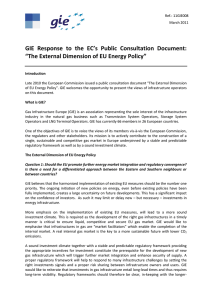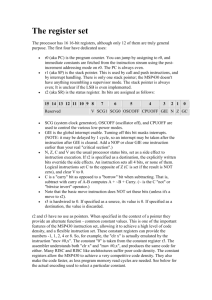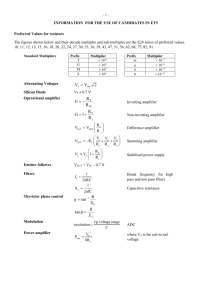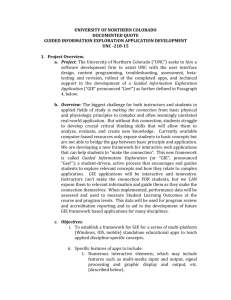CAPITALISM IN THE INFORMATION AGE: CONTINUITY OR CHANGE? University of Warwick
advertisement
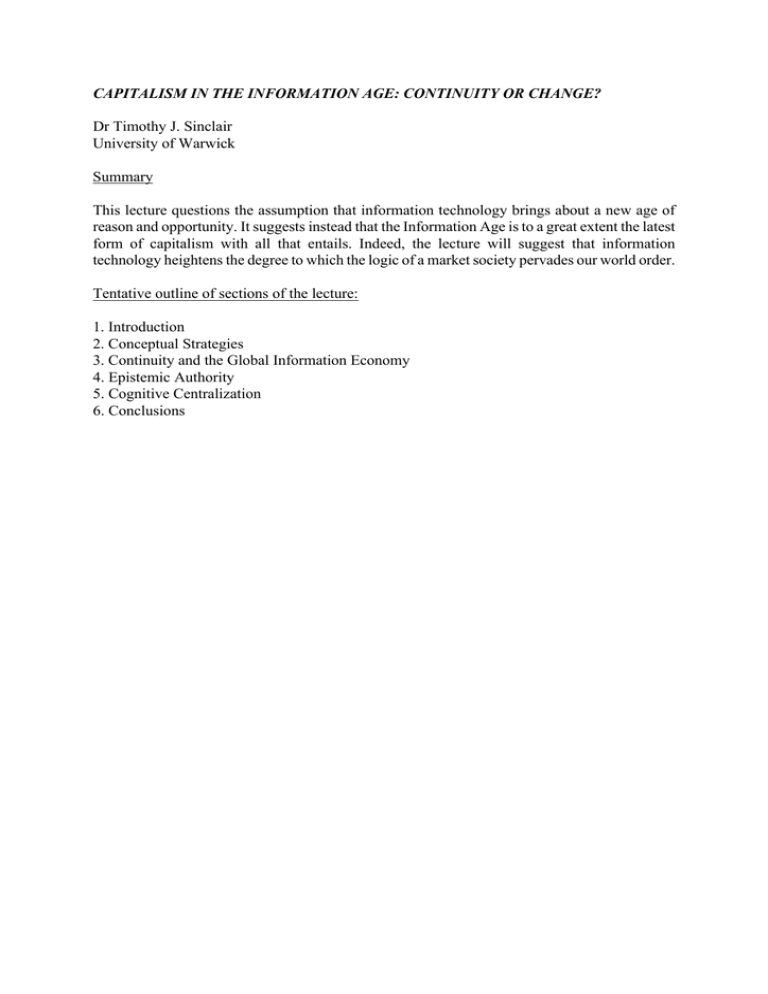
CAPITALISM IN THE INFORMATION AGE: CONTINUITY OR CHANGE? Dr Timothy J. Sinclair University of Warwick Summary This lecture questions the assumption that information technology brings about a new age of reason and opportunity. It suggests instead that the Information Age is to a great extent the latest form of capitalism with all that entails. Indeed, the lecture will suggest that information technology heightens the degree to which the logic of a market society pervades our world order. Tentative outline of sections of the lecture: 1. Introduction 2. Conceptual Strategies 3. Continuity and the Global Information Economy 4. Epistemic Authority 5. Cognitive Centralization 6. Conclusions CAPITALISM IN THE INFORMATION AGE: CONTINUITY OR CHANGE? by Timothy J. Sinclair, Ph.D Department of Politics and International Studies University of Warwick Coventry CV4 7AL England timothy.sinclair@warwick.ac.uk Lecture to be given to the United Nations University Global Seminar, 2nd Shimane Session, “IT, the Family, and Gender: Coping with Socio-economic Change in the Information Age.” July 24-27, 2001 University of Shimane Shimane Prefecture, Japan © Timothy J. Sinclair, 2001 1 [M]any areas of life - from auditing to corporate governance, from market research to the output of the financial services industry - will be transformed by pervasive standardization of judgments... (Martin 1997). A feature of the debate about the emerging Global Information Economy (GIE) is the notion that an expansion of information manipulation is opening up new vistas of personal development and social progress.1 A deluge of newspaper reports and television shows anticipate the shape of this tempting world just around the corner, and ask us to accept that the rules that govern our lives have fundamentally changed. This new order will, we are told - more than ever - be one of our making (Chapman 1996). I want to qualify this discourse in order to arrive at a more balanced prognosis for the GIE. I argue that the utopianism characteristic of current projections about the GIE is based on an undersocialized or insufficiently social view of the world. In this account, Information Technology (IT) is attributed a globally transformative role, rather than understood as a resource which interacts with pre-existing social structures and strategies. 1 Earlier versions of this lecture have been read at meetings of the American Political Science Association and the Internatinal Studies Association. Some themes appear in Sinclair, 1999 and 2000. 2 The role of IT in global change has been misunderstood. On the one hand, the expansion of IT is said to be a key development in the contemporary world which creates new opportunities for personal growth and social advancement (Negraponte 1995). On the other, equally fervent dystopias are suggested (Stoll 1995). The view offered here is not that either vision is right or wrong - there may be wisdom in each rather, that they identify the wrong target. It is not, in fact, technology that is the most significant feature of the developments we are witnessing. Instead, we need to understand the implications inherent in the creation of the socio-economic phenomenon I call the Global Information Economy. What is the GIE? The GIE is an emerging complex of information and knowledge production, distribution and consumption which is tending to displace the material mass production economies of the Keynesian Welfare State (KWS) that dominated the postWorld War II era in the developed world. The KWS system was premised on the routinized production of large quantities of similar material goods, full employment and relatively interventionary governments (Drache 1996). The GIE, by contrast, is based on customized niche markets for specialized, immaterial or informational goods, highly flexible employment conditions, and governments which focus on creating the conditions for private profitability rather than pre-defined economic outcomes. Research into the GIE must step back from an exclusive focus on technology and consider the political implications of the core analytical procedures and judgmental systems built into or assumed by technology. I argue that the major principles of GIE 3 organization remain tightly woven into pre-existing socially embedded networks of knowledge and authority. IT provides the means through which these systems can be exported from place to place. A process that I term cognitive centralization seems to be unfolding. Cognitive centralization results from the global networking of knowledge. It is characterized by homogenization pressures on common thought processes and professional analytical techniques. This process seems likely to change the limits of possible social action in the GIE, narrowing the range of collective responses to economic and political uncertainty to those which fall within the set of assumptions implicit in these systems. The KWS cognitive world, by contrast, was one of considerable diversity in what could be considered legitimate approaches to problems within countries. While the potential for diversity seems at first to be enhanced by the communicative potential of the GIE, providing multiple outlets for things like personality development (Turkle 1995), this is actually a relatively minor feature of one component of the GIE. Conceptual Strategies What are the best means to understand the GIE? My argument is that Gramscianinfluenced tools provide a good fit (Cox with Sinclair 1996). My reason for highlighting the salience of this toolkit is that the Gramscian world view explicitly seeks to combine both material and ideational elements. Much of the thinking about IT we are used to engaging in is focused on the technology itself and sees society as epiphenomenal. Social structure and interests are left out of consideration. The arguments about 4 embeddedness and epistemic authority developed below suggest that the social processes in which order is generated and a particular set of ideas, analytical frameworks and judgmental systems come to be pervasive, are crucial for understanding the nature and limits of this instance of social power. Gramscian-inspired thinking may help clarify the consequences of the inequalities produced by the GIE. By inequalities I do not mean the commonplace insight that those with machines will have privileges versus those without. What I wish to suggest is that the emerging GIE seems to be organized around a different coalition of interests than was the KWS. Indeed, Drucker has argued that the pressing social challenge of "post-capitalist society" will be to find some way to preserve the "dignity" of the non-knowledge workers who will be the majority, but who will not be the primary source of wealth production (Drucker 1993, 8). Gramscian-derived thinking is useful in this context because it is able to incorporate the sort of social alliance pay-offs that Drucker describes. The extensive elaboration of this conceptual apparatus in relation to a research program on the GIE is not, however, attempted in this paper. Continuity and the Global Information Economy Despite much rhetoric to the contrary, I argue that continuity is a major feature of the GIE. We should anticipate political struggles in the GIE in which there will be distributional winners and losers, as was the case in the KWS. Accordingly, in identifying the GIE I am not suggesting here a radical break from current social organization. This view certainly implies the need for caution in evaluating arguments which are premised on a major role for IT in human emancipation. I will elaborate on 5 the case for this pessimism in the next section. However, by arguing for continuity I do not wish to obscure all change. It is just that change - what Webster has called informatization - will continue to be "subordinate" to established structures and processes in capitalist society (Webster 1995: 5). Change is occurring in the sense that the GIE is giving rise to a more thorough process of cognitive centralization than could have happened in the KWS. The basis for work discipline and social segmentation is heightened by the GIE, and the context for resistance to such control is eroded. IT, or more specifically, the way it is incorporated into the work process, facilitates the greatest degree of monitoring, of comparison, of pace-setting, and of reward-giving (Lyon 1994). At the same time, the more atomized work conditions created by the home office, by the routinization of what was once ‘white collar’ work by a seeming promotional ladder to professional work, hinder the creation of collective identity amongst knowledge workers. Epistemic Authority Many ways of thinking about economic and political processes assume the availability and ready incorporation of multiple, transparent forms of knowledge into the choices we all make in our everyday lives. I want to argue instead that an embedded view of choice is more accurate, and that this leads to embracing a view of knowledge which revolves around its authoritative character. By an embedded view of choices, I mean that limits on possible choices are established by pre-existing networks of social relations (Granovetter 1992). Not all choices are possible. Contrary to the mythology, 6 on the whole, the GIE distributes and perpetuates rather than challenges embedded, authoritative forms of knowledge. The continuing centrality of embeddedness makes it possible to think about information and knowledge in ways other than as a vehicle for the furthering of transparency. What I mean here is that we are socialized into a fundamentally liberal view that information provides the key to understanding puzzles, to getting beyond inherited commonsense and prejudice, but in fact, what we tend to value as incisive knowledge, as cutting-edge thinking, reflects a set of social incentives, and is not self-evidently good or based on merit. Knowledge is bound up with authority in that the social relations of asymmetry between the speaker and the citizenry (or audience) cognitively prefigure the reception and response to what is spoken. We classically think of knowledge in persuasive terms, as arguing a case, as I am attempting to do here. But the exercise of epistemic authority does not rest on persuasion. Its authoritativeness rests on the assertion that the identity of the speaker demands our attention (Lincoln 1994, 5). My argument is that many of the sources of information and knowledge promoted by the GIE have this characteristic. The Global Information Economy does not break with hierarchy. Instead, it reproduces it in new forms and extends it to new realms. Cognitive Centralization As a purveyor of embedded, epistemic authority, the GIE is central to cognitive centralization. Ways of thinking and associated practices are increasingly not just constrained but actually generated by the dispersal of analytical frameworks and 7 judgmental systems in the social channels that comprise the GIE. The GIE is no longer, if it ever was, some sort of conceptual 'Wild West' or 'New World' (Gunkel and Gunkel 1997; Bettig 1997). While the GIE is based in the core, it is increasingly spreading its influence to the periphery. I have written elsewhere, for example, about the growth of branches of the major American credit rating agencies around the world (Sinclair 2000). Cognitive centralization is much more than the mere emulation of American popular culture or the spread of the 'American' language (Crystal 1997). Its significance goes deeper than consumption. This level of transnational socialization was a defining feature of the KWS world order, but I claim that cognitive centralization is a more pervasive infrastructural condition. What I identify here is not the reduction of all practices and habits to those of Anglo-American capitalism. Rather, what I observe is a steady process of delegitmization of alternate ways of solving problems, of thinking through issues, and elaborating mechanisms for economic and social policy. Over the long haul, even as alternative cognitive practices continue to emerge and compete with the epistemically authoritative, I suggest that the basis for that competition is narrowing and increasingly permissive only of cultural expressions, especially where such expressions can be commodified (Tagliabue 1996). The places to look for cognitive centralization, are amongst others, in accounting practices, in the organization of schooling and university research, in privatization programs, in the use of foreign consultants and advisers, and in models of corporate reorganization. These are where local or national expertise is especially vulnerable to the predations of cognitive centralization. A feature of cognitive centralization is the 8 development of new processes in which intellectual property is mass produced (Martin 1997). These offer the potential for lowering costs and undermining the workplace power of Reich's well-paid symbolic analysts (Reich 1991). The IT tools Martin identifies that assist this emerging routinization of intellectual work are large risksensitive databases and search systems which offer the potential to automate judgment. The exploration of these strategic processes comprise an important research program. Conclusions A feature of the argument of this talk is that the political significance of IT is in some ways actually less than usually thought. Rather than IT being significant in itself, it is the distribution of analytical schemes and systems of judgment which are likely to have the greatest implications for global political relations. IT is a new tool of social conflict, embedded in socially organized systems of choice. Knowledge is not the transparent thing we assume it to be. It is socially validated and thus has an authoritative dimension to it. The result of embeddedness and epistemic authority, when combined with the potential for control offered by IT (Schiller 1996), is to generate what I have called a process of cognitive centralization. Gramscian thought may provide useful tools for comprehending the social alliances that are developing around these processes. As I see things, IT is not itself likely to change the foundations of social organization in Japan, America or anywhere else for that matter. This is because the GIE is premised on broadly the same system of social organization which characterized the KWS. 9 What has changed is that the GIE is more disciplinary in character, and socially exclusive than the KWS, and has new tools of control. The scope for worker resistance and analytical heterogeneity is squeezed, although cognitive centralization does not eliminate the potential for future unorthodox thinking if circumstances place cognitive centralization in crisis. Cognitive centralization comes with certain systemic costs, including a heightened fragility in the social order which underpins the GIE, given the narrower social alliance this hegemonic system is built on. While this is unlikely to break down anytime soon, its fragility does suggest that the future of the GIE will be marked by ongoing social conflicts and shifting alliance formation dramas like the battle in Seattle and the recent events in Gothenburg, Sweden. Cognitive centralization perhaps lowers the potential for class conflict, but social dialetics are still there and may erupt when conditions are conducive. 10 Works Cited Bettig, Ronald V. 1997. "The Enclosure of Cyberspace." Critical Studies in Mass Communication. Number 14, pp. 138-157. Chapman, Gary. April 22, 1996. "Local Communication Systems Key to Enhancing 'Social Capital.'" The Los Angeles Times, p. D6. Cox, Robert W. with Timothy J. Sinclair. 1996. Cambridge: Cambridge University Press. Approaches to World Order. Crystal, David. February 22, 1997. "The Language That Took Over the World." The Guardian, p. 21. Drache, Daniel. 1996. "From Keynes to Kmart: Competitiveness in a Corporate Age." In States Against Markets: The Limits of Globalization. Edited by Robert Boyer and Daniel Drache. New York: Routledge. Drucker, Peter F. 1993. Post-Capitalist Society. New York: HarperBusiness. Granovetter, Mark. 1992. "Economic Action and Social Structure: The Problem of Embeddedness," in The Sociology of Economic Life. Mark Granovetter and Richard Swedberg, eds. Boulder, CO: Westview. Gunkel, David J. and Ann Hetzel Gunkel. 1997. "Virtual Geographies: The New Worlds of Cyberspace." Critical Studies in Mass Communication. Number 14, pp. 123-137. Lincoln, Bruce. 1994. Authority: Construction and Corrosion. Chicago: University of Chicago Press. Lyon, David. 1994. The Electronic Eye: The Rise of Surveillance Society. Minneapolis: University of Minnesota Press. Martin, Peter. November 13, 1997. "Thinking Along the Same Lines: A Revolution is Occuring in Information Processing That Will Change the Way We Work." Financial Times, p. 31. Negraponte, Nicholas. 1995. Being Digital. New York: Knopf. Reich, Robert B. 1991. The Work of Nations. New York: Vintage. Schiller, Herbert I. 1996. Information Inequality: The Deepening Social Crisis in America. New York: Routledge. 11 Sinclair, Timothy J. 1999. “Synchronic Global Governance and the International Political Economy of the Commonplace.” Approaches to Global Governance Theory. Edited by Martin Hewson and Timothy J. Sinclair. Albany, NY: State University of New York Press. ______. 2000. “Reinventing Authority: Embeddded Knowledge Networks and the New Global Finance.” Environment and Planning C: Government and Policy. Volume 18, Number 4, pp. 487-502. Stoll, Clifford. 1995. Silicon Snake Oil: Second Thoughts on the Information Highway. London: Pan. Tagliabue, John. October 15, 1996. "Local Fare Pushing U.S. Shows Out of Prime Time." International Herald Tribune, p. 2. Turkle, Sherry. 1995. Life on the Screen: Identity in the Age of the Internet. London: Weidenfeld & Nicolson. Webster, Frank. 1995. Theories of the Information Society. London: Routledge.
